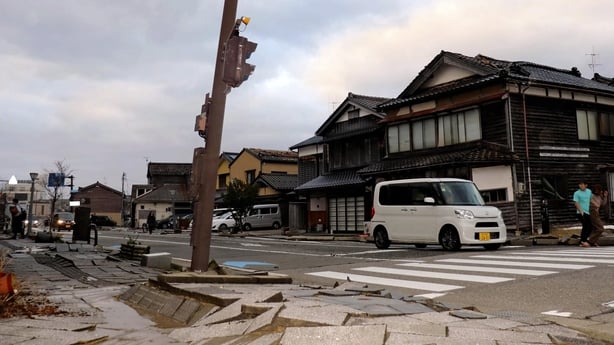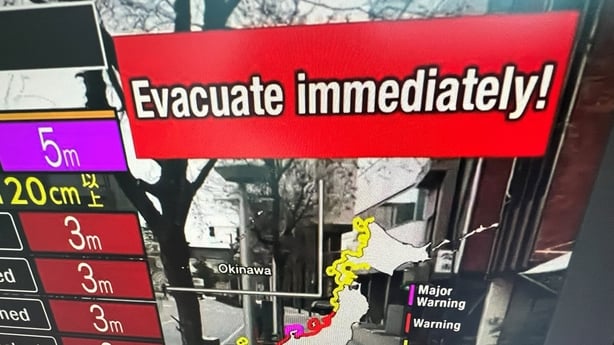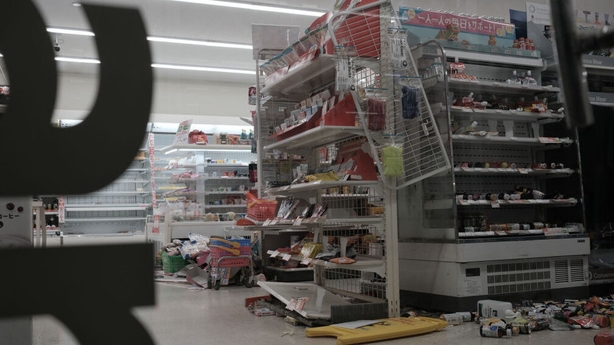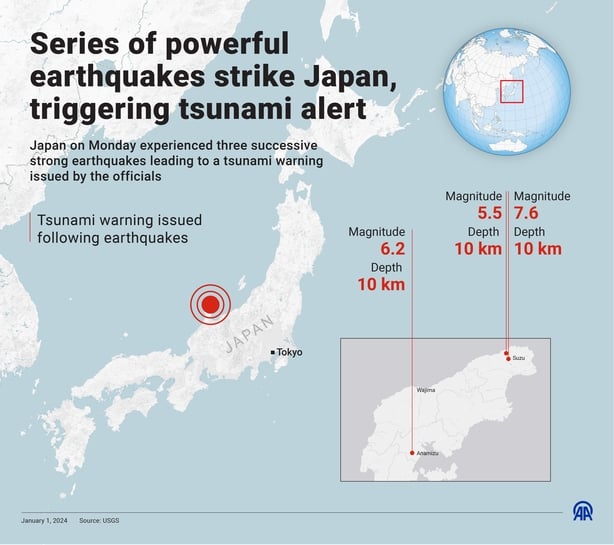At least six people have died in a powerful earthquake that hit central Japan, as police and local authorities reported cases of bodies being pulled from the rubble of collapsed buildings.
The quake, with a preliminary magnitude of 7.6, struck in the middle of the afternoon local time, destroying buildings, knocking out power to tens of thousands of homes and prompting residents in some coastal areas to flee to higher ground.
It also triggered waves about 1m high along Japan's long western seaboard as well as in neighbouring South Korea.
Army personnel were dispatched to help with rescue operations, while one local airport was shut down after the quake tore open cracks in the runway.
An elderly man was pronounced dead after a building collapse in Shika Town in Ishikawa prefecture, broadcaster NTV reported citing local police.
Kyodo News reported four deaths in Ishikawa, quoting the Prefectural Crisis Management Team, including a man and woman in their 50s, a man in his 70s and a young boy.
The Asahi newspaper cited police as saying a man in his 90s had been pulled from the wreckage of a building and taken to hospital but confirmed dead.
Television channels interrupted normal services with special programming, including a message from Prime Minister Fumio Kishida, who urged people in vulnerable areas to "evacuate as soon as possible" to higher ground.
"We realise your home, your belongings are all precious to you, but your lives are important above everything else! Run to the highest ground possible," an alarmed presenter on broadcaster NHK told viewers.

Japanese Prime Minister Fumio Kishida told reporters that it was proving difficult for search and rescue teams to reach the worst affected areas due to blocked roads.
US President Joe Biden said in a statement that the United States was ready to provide any necessary help to Japan after the earthquake.
"As close allies, the United States and Japan share a deep bond of friendship that unites our people. Our thoughts are with the Japanese people during this difficult time".
The Japanese government said that it had ordered more than 97,000 people in nine prefectures on the western coast of main island Honshu to leave their homes.
They are spending the night in sports halls and school gymnasiums, commonly used as evacuation centres in emergencies.
The Imperial Household Agency said that following the disaster it would cancel Emperor Naruhito and Empress Masako's planned New Year appearance tomorrow.

Images on social media showed cars and houses in Ishikawa shaking violently and terrified people cowering in shops and train stations. Houses collapsed and huge cracks appeared in roads.
"I have never experienced anything like this before, it was scary. I went out right away but the ground was shaking," an elderly man told broadcaster NHK.
"We are in a horrible situation. Please come and help us," said one person in a video they shared, showing several badly damaged houses.

A major fire in Wajima engulfed a row of houses, video footage showed, with people being moved from their homes in the dark, some with blankets and others carrying babies.
"There is a large fire. We cannot immediately tell how many houses are affected by it," a firefighter with the Wajima Fire Department said.
Fire engines struggled to reach the scene due to damaged roads and other obstacles, he added.
The department was swamped with calls, with "numerous" reports of people injured and trapped inside collapsed buildings, he said.
Many houses collapsed in the city of Suzu, acording to reports.

Several major motorways were closed around the epicentre, Japan's road operator said, and bullet train services from Tokyo were also suspended.
Flights and mobile phone coverage were reportedly disrupted while many convenience stores were shut.
Defense Minister Minoru Kihara said that 1,000 defence forces personnel were preparing to go to the region, while 8,500 others were on standby.
Around 20 military aircraft were dispatched to survey the damage.
The Japan Meteorological Agency warned local residents of possible further quakes during the coming week or so, particularly within the next two to three days.
No issues at nuclear plants reported
Japan experiences hundreds of earthquakes every year and the vast majority cause no damage.
The country has strict regulations intended to ensure buildings can withstand strong quakes and routinely holds emergency drills.
The quake comes at a sensitive time for Japan's nuclear industry, which has faced fierce opposition from some locals since the 2011 earthquake and tsunami that triggered nuclear meltdowns in Fukushima.
Whole towns were devastated in that disaster.
The Nuclear Regulation Authority said no irregularities were found at nuclear plants along the Sea of Japan, including five active reactors at Kansai Electric Power's 9503.T Ohi and Takahama plants in Fukui Prefecture.
Hokuriku Electric's Shika plant, the closest to the epicentre, had already halted its two reactors before the quake for regular inspections and saw no impact from the quake, the agency said.
